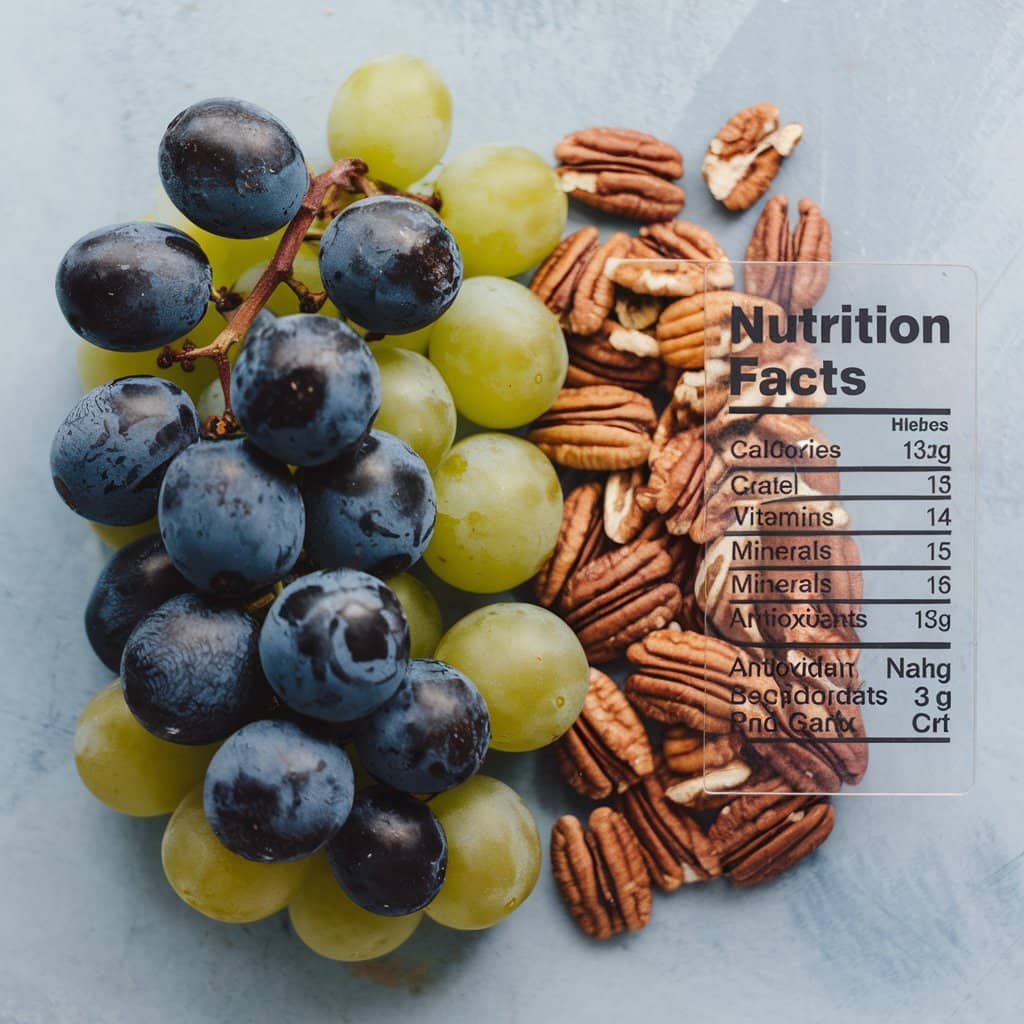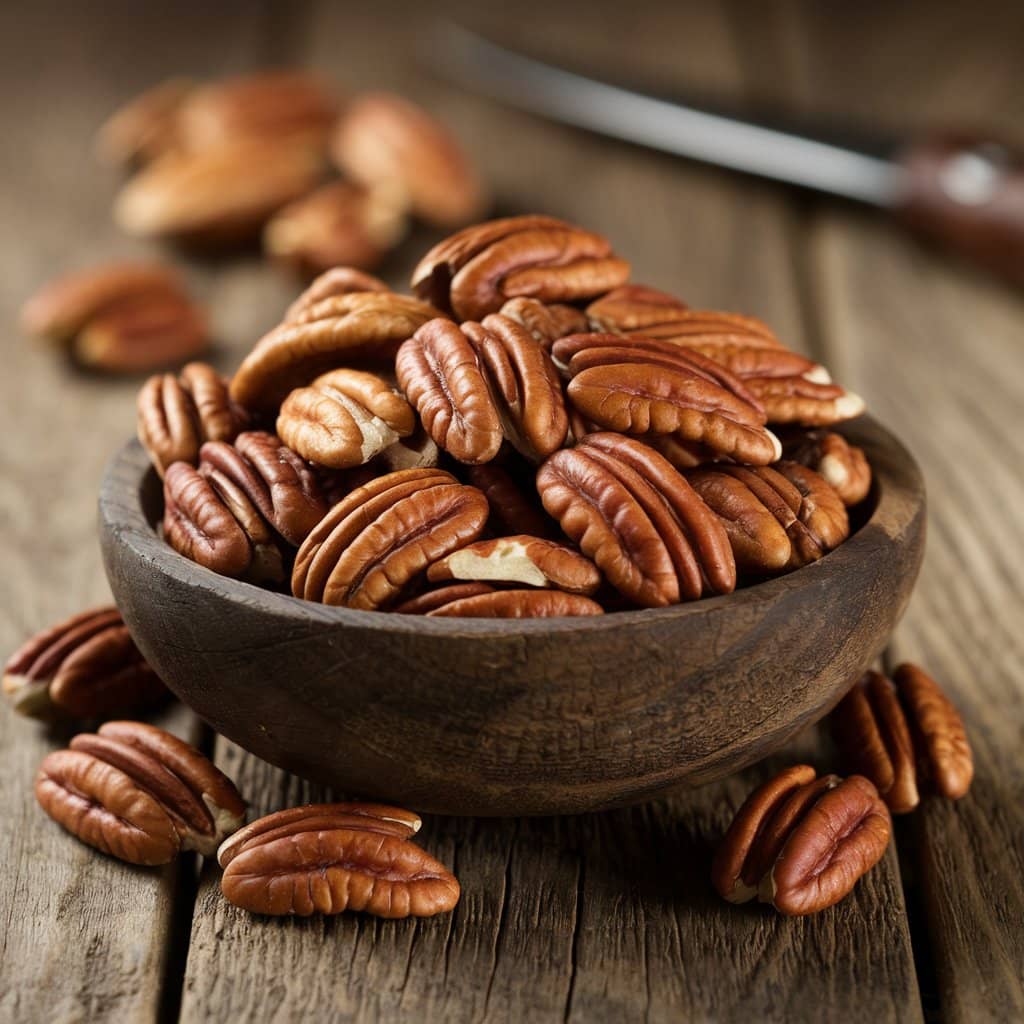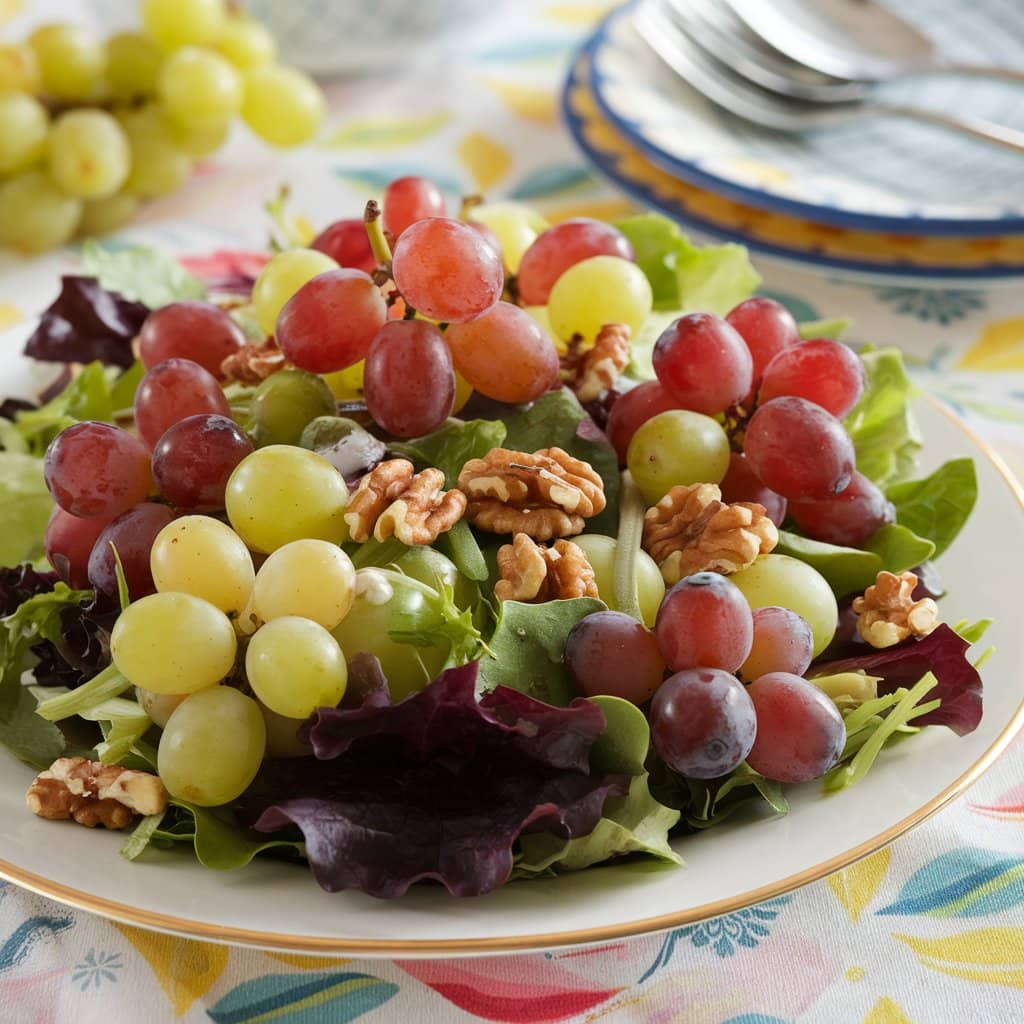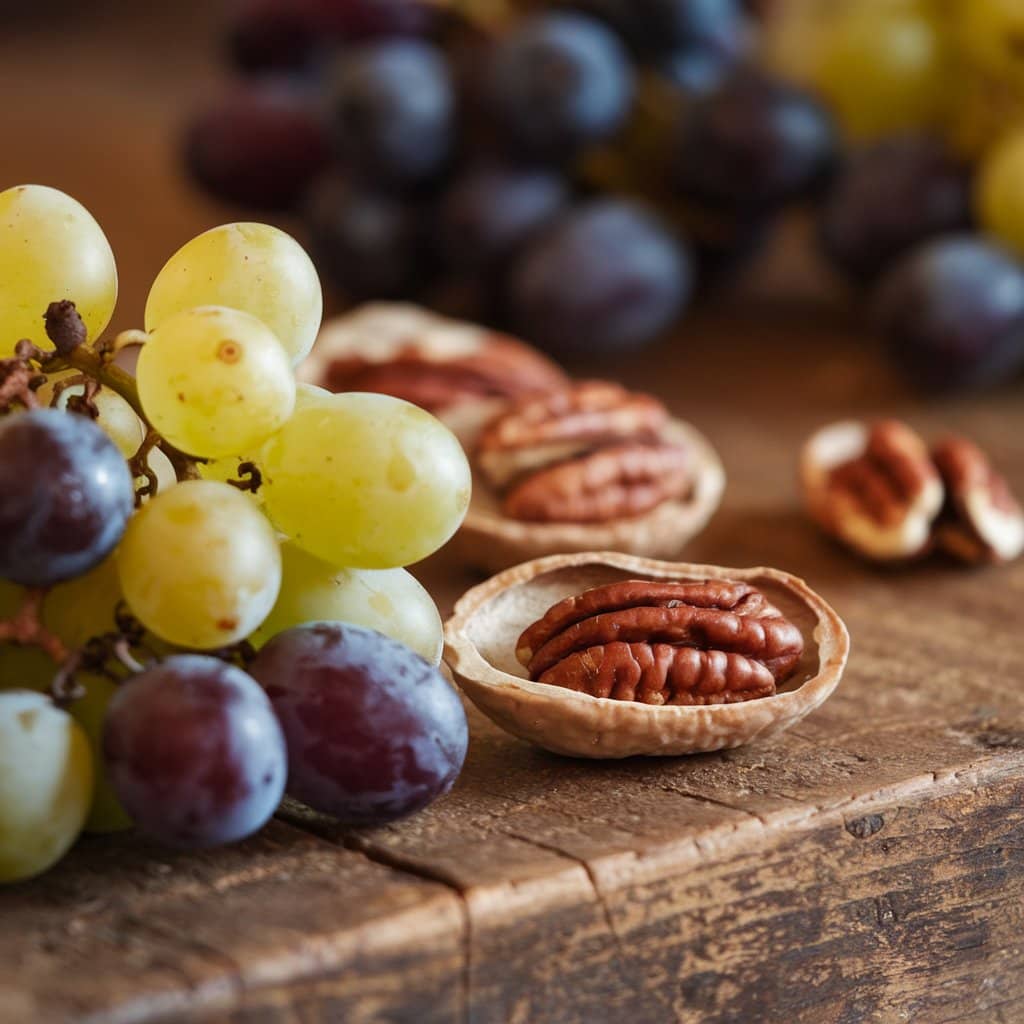Are Grapes and Pecans Good for You? Grapes and pecans are not only delicious but also packed with essential nutrients. Grapes are juicy and refreshing, while pecans are rich and crunchy. Both have long been celebrated for their unique health benefits. But are grapes and pecans genuinely good for you? In this article, we’ll dive into the nutritional profiles, health advantages, and best ways to incorporate these superfoods into your diet. By the end, you’ll know why adding them to your meals can be a smart choice for your overall well-being.
Table of contents
Nutritional Overview of Grapes and Pecans
Grapes: Key Nutrients
Grapes are small but mighty fruits that come in various colors, including green, red, and black. Here’s a closer look at what makes grapes a nutritional powerhouse:
- Grapes are packed with essential nutrients that support overall health:
- Vitamins: Grapes are an excellent source of vitamins C and K, which are essential for immune health and bone strength.
- Minerals: Additionally, they contain potassium and manganese, both of which play a crucial role in supporting heart health and boosting metabolism.
- Antioxidants: Moreover, grapes are loaded with polyphenols like resveratrol, which are known for reducing inflammation and protecting against chronic diseases.
- Fiber: A serving of grapes also provides dietary fiber, aiding digestion and promoting gut health.
- Hydration: Finally, due to their high water content, grapes help keep you hydrated and feeling refreshed.

Nutrition Facts (per 1 cup/151g of grapes):
| Key Nutrients | Per 1 cup/151g of grapes |
| Calories | 104 |
| Carbohydrates | 27g |
| Fiber | 1.4g |
| Vitamin C | 27% of the Daily Value (DV) |
| Vitamin K | 28% of the DV |
Pecans: Key Nutrients
Pecans are nutrient-dense nuts native to North America. In addition, their rich, buttery flavor is complemented by a wide range of nutritional benefits, making them both delicious and highly nutritious.
- Healthy Fats: Pecans are high in monounsaturated fats, which support heart health and reduce bad cholesterol levels.
- Vitamins and Minerals: They provide vitamins A, E, and several B vitamins, as well as zinc, magnesium, and phosphorus.
- Protein and Fiber: A handful of pecans offers protein and dietary fiber, helping with satiety and digestion.
- Antioxidants: Pecans are among the top antioxidant-rich nuts, helping to combat oxidative stress.
Nutrition Facts (per 1 ounce/28g of pecans):
- Calories: 196
- Carbohydrates: 4g
- Fiber: 2.7g
- Protein: 2.6g
- Magnesium: 8% of the DV
- Vitamin E: 2% of the DV
Are Grapes Good for You? Discover Their Amazing Health Benefits
Grapes have been enjoyed for thousands of years, not just for their sweet taste but also for their numerous health benefits. From boosting heart health to supporting skin vitality, grapes offer a range of nutritional advantages backed by science.

How Grapes and Pecans Support Heart Health Naturally
Grapes are considered heart-friendly fruits due to their high content of antioxidants and essential nutrients:
- Resveratrol: Found primarily in red and black grapes, resveratrol is a powerful antioxidant that can help reduce inflammation and lower the risk of heart disease.
- Flavonoids: These compounds improve blood circulation and reduce the buildup of cholesterol in the arteries.
- Potassium: Grapes contain potassium, which helps regulate blood pressure by counteracting sodium’s effects.
Research Insight: Several studies have linked grape consumption to reduced blood pressure, lower cholesterol levels, and improved heart function over time. As a result, adding grapes to your diet may support better cardiovascular health.
Can Grapes and Pecans Help with Weight Management and Fitness Goals?
Grapes can be a great addition to a weight management plan:
- Low-Calorie Snack: A cup of grapes contains about 100 calories, making them a satisfying and guilt-free snack.
- Natural Sugars and Fiber: While grapes are naturally sweet, their fiber content helps control blood sugar spikes and promotes feelings of fullness.
- Hydration: Since grapes are over 80% water, they help you stay hydrated, which can curb hunger.
Skin Health and Anti-Aging Benefits
The antioxidants in grapes can work wonders for skin health due to their powerful protective properties:
- Resveratrol and Vitamin C: These essential nutrients not only combat free radicals but also reduce signs of aging. Furthermore, they promote collagen production, which helps keep skin firm and youthful.
- Hydration Boost: In addition, the high water content of grapes keeps the skin moisturized from within, supporting a healthy, radiant complexion.
- UV Protection: Finally, some studies suggest that certain compounds in grapes may offer protection against UV-induced skin damage, reducing the risk of premature aging caused by sun exposure.
Digestive Support
Grapes are good for digestion due to their fiber content:
- Fiber-Rich: Grapes contain both soluble and insoluble fiber, promoting healthy digestion and preventing constipation.
- Gut Health: Their polyphenols support a balanced gut microbiome, fostering beneficial bacteria.
Eye Health
Compounds found in grapes can benefit vision:
- Lutein and Zeaxanthin: These antioxidants protect against macular degeneration and reduce the risk of age-related vision loss.
- Vitamin A: Although grapes are not very high in vitamin A, their other antioxidants can indirectly support eye health by reducing oxidative stress.
Are Pecans Healthy? Explore Their Top Health Benefits and Nutritional Value
Pecans are more than just a tasty ingredient in pies and baked goods. They are nutrient-dense nuts that provide a variety of health benefits. Packed with essential vitamins, minerals, healthy fats, and antioxidants, pecans support heart health, brain function, and even weight management. Let’s explore the key health advantages of adding pecans to your diet.

Heart Health and Cholesterol Management
Pecans are heart-friendly due to their content of healthy fats and antioxidants:
- Monounsaturated Fats: Pecans are rich in oleic acid, a type of heart-healthy fat that helps reduce bad cholesterol (LDL) while raising good cholesterol (HDL).
- Plant Sterols: These natural compounds in pecans lower cholesterol absorption in the body, reducing heart disease risks.
- Antioxidants: Pecans contain powerful antioxidants like vitamin E and polyphenols, which reduce inflammation and prevent oxidative damage linked to heart disease.
Research Insight: Studies have found that consuming pecans regularly can lower total cholesterol levels by up to 10%.
Brain Function and Mental Health
The nutrients in pecans promote better brain health and cognitive function:
- Vitamin E and Antioxidants: These nutrients protect brain cells from oxidative stress, reducing the risk of cognitive decline and neurodegenerative diseases such as Alzheimer’s.
- Healthy Fats: Omega-3 and monounsaturated fats in pecans support brain function by improving memory and mental clarity.
- Thiamine (Vitamin B1): Pecans provide thiamine, essential for energy production and nerve function.
Weight Control and Appetite Regulation
Contrary to popular belief, nuts like pecans can help with weight management:
- Protein and Fiber: The combination of protein and dietary fiber in pecans promotes satiety, reducing overall calorie intake.
- Healthy Fats: The fats in pecans slow digestion, helping maintain stable energy levels throughout the day.
- Portion Control Tip: A small handful of pecans (about 1 ounce or 19 halves) makes a satisfying and nutrient-rich snack.
Research Insight: Studies suggest that people who include nuts in their diet tend to have lower body weights and better overall health markers.
Blood Sugar Regulation
Pecans are also beneficial for managing blood sugar levels:
- Low Glycemic Index: Pecans have a minimal impact on blood sugar due to their low carbohydrate content.
- Magnesium: This mineral helps regulate insulin sensitivity, promoting better blood sugar control.
- Healthy Fats and Fiber: These slow the absorption of sugar into the bloodstream, preventing sharp spikes in glucose levels.
Bone and Joint Health
The minerals found in pecans contribute to stronger bones and healthier joints:
- Magnesium and Phosphorus: These minerals are essential for bone density and skeletal health.
- Calcium and Zinc: While not as high as in dairy products, pecans still provide these minerals, supporting joint mobility and reducing the risk of osteoporosis.
Best Ways to Add Grapes and Pecans to Your Diet for Maximum Health Benefits
Grapes and pecans are both nutrient-rich foods, but they differ significantly in terms of calories, macronutrients, and health benefits. Let’s break down their nutritional profiles and compare their health impacts.

Nutritional Breakdown
To better understand their nutritional differences, let’s take a closer look at a side-by-side comparison of grapes and pecans based on a standard serving size. While both foods are highly nutritious, they differ significantly in terms of calories, macronutrients, and essential vitamins and minerals. On one hand, grapes provide a refreshing, low-calorie option that’s rich in water and antioxidants. On the other hand, pecans offer a calorie-dense, nutrient-packed snack loaded with healthy fats, protein, and fiber. Therefore, examining their nutritional profiles side by side can help determine which is more suitable for your dietary needs and health goals.
| Nutrient | Grapes (1 cup – 151g) | Pecans (1 ounce – 28g) |
|---|---|---|
| Calories | 104 | 196 |
| Carbohydrates | 27g | 4g |
| Protein | 1g | 2.6g |
| Fat | 0.2g | 20.5g |
| Fiber | 1.4g | 2.7g |
| Vitamin C | 27% of DV | 1% of DV |
| Vitamin E | 1% of DV | 2% of DV |
| Magnesium | 2% of DV | 8% of DV |
| Potassium | 288mg | 116mg |
| Antioxidants | High (Resveratrol) | High (Polyphenols) |
Which Is Better for Heart Health?
- Grapes: Due to their high levels of resveratrol and potassium, grapes are excellent for reducing blood pressure and improving heart function.
- Pecans: Their heart-healthy monounsaturated fats and cholesterol-lowering plant sterols make pecans great for cardiovascular health.
Winner: Both are beneficial, but pecans have a slight edge due to their healthy fat content.
Which Is Better for Weight Management?
- Grapes: Low in calories and high in water, grapes are ideal for a light, hydrating snack. However, they contain natural sugars, so portion control is important.
- Pecans: Although high in calories, pecans provide protein, fiber, and healthy fats, helping to control hunger and reduce overeating.
Winner: Grapes are better for low-calorie snacking, while pecans work well for satisfying long-term hunger.
Best for Blood Sugar Control
- Grapes: While they have a high glycemic index due to their natural sugars, their fiber content helps regulate blood sugar when eaten in moderation.
- Pecans: Pecans have a minimal impact on blood sugar due to their low carb content and high healthy fat composition.
Winner: Pecans are more suitable for managing blood sugar levels.
Best for Overall Nutrition
- Grapes: They provide a broader range of vitamins (especially C and K) and antioxidants, supporting immunity and skin health.
- Pecans: They excel in providing minerals like magnesium, phosphorus, and zinc, which are essential for bone, muscle, and nerve function.
Winner: Both are valuable but serve different nutritional needs.
Final Verdict:
- Choose Grapes If: You want a hydrating, low-calorie fruit packed with vitamins and antioxidants.
- Choose Pecans If: You need a nutrient-dense snack full of healthy fats, fiber, and essential minerals.
Creative Ways to Add Grapes and Pecans to Your Diet
Incorporating grapes and pecans into your daily meals is easy and rewarding. Whether you prefer snacking, cooking, or making refreshing drinks, these nutrient-rich foods can enhance both flavor and health benefits. Here are some practical ideas to enjoy grapes and pecans in different ways.
Snack Ideas
- On-the-Go Snack:
- Grab a handful of grapes and pecans for a quick, balanced snack that provides both sweetness and crunch.
- Trail Mix:
- Mix pecans, dried grapes (raisins), seeds, and dark chocolate chips for a DIY trail mix that’s both energizing and delicious.
- Frozen Grapes:
- Freeze grapes for a refreshing summer treat that tastes like natural candy.
- Nut Butter & Grapes:
- Spread pecan butter on whole-grain toast and top with halved grapes for a twist on peanut butter and jelly.
Breakfast Boosters
- Smoothie Bowl:
- Blend frozen grapes with spinach, Greek yogurt, and bananas. Top with chopped pecans, chia seeds, and berries for extra crunch and nutrition.
- Oatmeal Topping:
- Sprinkle pecans and sliced grapes on top of oatmeal or porridge for added texture and a hint of sweetness.
- Yogurt Parfait:
- Layer Greek yogurt with grapes, pecans, and a drizzle of honey for a protein-packed breakfast or snack.
Salads and Main Courses
- Mixed Green Salad:
- Toss grapes, pecans, mixed greens, goat cheese, and a balsamic vinaigrette for a refreshing salad perfect for any meal.
- Chicken Salad:
- Add chopped grapes and pecans to a chicken salad mix with Greek yogurt or mayonnaise for added crunch and sweetness.
- Quinoa Bowl:
- Combine cooked quinoa with roasted pecans, grapes, feta cheese, and arugula. Dress with a lemon vinaigrette for a hearty, nutrient-dense meal.
Desserts and Treats
- Fruit and Nut Bars:
- Make homemade energy bars with oats, pecans, raisins, and a touch of maple syrup for a sweet, nutritious treat.
- Grape & Pecan Tart:
- Use grapes and pecans as toppings for a rustic tart with a whole-grain crust and light cream filling.
- Chocolate-Covered Pecans and Grapes:
- Dip grapes and pecans in dark chocolate for a decadent, antioxidant-rich dessert.
Drinks and Smoothies
- Grape and Pecan Smoothie:
- Blend grapes, spinach, pecan butter, and almond milk for a creamy, nutrient-packed smoothie.
- Grape-Infused Water:
- Add fresh grapes and mint leaves to water for a naturally flavored, refreshing drink.
- Healthy Pecan Milk:
- Soak pecans overnight, blend with water, and strain to create homemade pecan milk — a creamy dairy-free alternative for coffee, smoothies, or cereal.
Portion Control Tips
- Watch Your Servings:
- Grapes are naturally high in sugar, so keep servings to 1 cup per snack or meal.
- For pecans, stick to about 1 ounce (19 halves) to avoid excessive calorie intake.
- Balance Your Meals:
- Pair grapes and pecans with protein sources like yogurt, cheese, or lean meats to create well-rounded meals.
Frequently Asked Questions (FAQs)
Are Grapes and Pecans Good for Weight Loss?
Yes, both grapes and pecans can be helpful for weight management when eaten in moderation:
- Grapes: Their high water content keeps you full with fewer calories. However, due to their natural sugars, portion control is essential.
- Pecans: Though calorie-dense, pecans provide healthy fats, protein, and fiber, which promote satiety and reduce overeating.
Can You Eat Grapes and Pecans Every Day?
Yes, both foods can be eaten daily as part of a balanced diet:
- Daily Serving Suggestion: 1 cup of grapes or a small handful of pecans (about 1 ounce).
- Tip: Rotate them with other fruits and nuts to maintain a diverse nutrient intake.
Are Grapes and Pecans Safe for Diabetics?
Yes, but moderation is crucial:
- Grapes: They have natural sugars but also contain fiber, which slows sugar absorption. Diabetics should consume them in small portions.
- Pecans: With a low glycemic index and high healthy fat content, pecans are diabetic-friendly and help stabilize blood sugar.
Do Grapes and Pecans Cause Allergies?
While rare, allergies can occur:
- Grapes: Some people may experience oral allergy syndrome, causing mild itching or swelling in the mouth.
- Pecans: Nut allergies are more common and can be severe. Consult a healthcare provider if you suspect an allergy.
Which Is Better for Heart Health?
Both foods support heart health in unique ways:
- Grapes: High in antioxidants like resveratrol, which reduces inflammation and promotes heart health.
- Pecans: Rich in monounsaturated fats, pecans lower bad cholesterol (LDL) and improve cardiovascular function.
How Do Grapes and Pecans Compare in Terms of Nutritional Value?
Both foods offer distinct nutritional profiles:
- Grapes: Rich in vitamins C and K, antioxidants, and water for hydration.
- Pecans: High in healthy fats, protein, minerals like magnesium and zinc, and powerful antioxidants.
Conclusion
In summary, grapes and pecans are nutrient-packed foods that offer a wide range of health benefits. Grapes are excellent for hydration, heart health, and skin vitality, while pecans are superb for heart health, brain function, and blood sugar management. Including both in your diet can enhance overall health, provided you watch portion sizes to avoid excess sugar or calorie intake.
Whether you’re looking for a sweet, juicy fruit or a crunchy, nutritious nut, grapes and pecans are delicious and versatile choices that can complement a balanced, health-conscious lifestyle.

